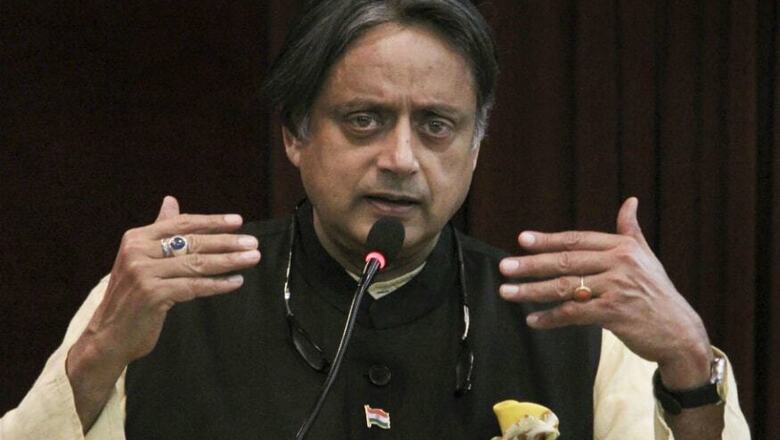Unfair to Burden Sonia, Many in Congress Hope Rahul Gandhi Agrees to Return as Chief: Shashi Tharoor

views
New Delhi: It is unfair to burden Sonia Gandhi with the responsibility running and reviving the Congress, senior party leader Shashi Tharoor has said, indicating a possible return to the top post by Rahul Gandhi who had resigned as chief after the general election defeat last year. In an interview to News18, Tharoor also virtually ruled out the possibility of a non-Gandhi becoming the party president, saying the family holds a “special place” in the hearts of Congress workers with “good reason”.
Edited excerpts:
The Congress seems to be in deep inertia. Apart from sporadic protests, it seems to be lost…
I don’t think we are in ‘deep inertia’. We have five strong and effective governments in Rajasthan, Punjab, Madhya Pradesh, Chhattisgarh and Puducherry that are, through their effective governance, reiterating every single day what a national government with the Congress at its helm could potentially have to offer for the citizens of this country.
We have also overcome our previous differences and established pragmatic coalitions with regional parties and formed alliances as a result in Maharashtra and Jharkhand that are also doing well. So to term our present state as one of inactivity and slumber is misleading. But I do think that your question is understandable in the sense that such positives are belied by our inability to adequately address a certain perception in the eyes of the public that we are adrift, which is hurting us since such an image will naturally drive voters towards other political alternatives.
The most recent example of this can be seen in Delhi, where the voters chose to side (primarily) with the AAP and (to a smaller extent) with the BJP, leaving us with naught. This is where the compelling case for urgently addressing this perception in the eyes of the public comes from — and for that matter, changing the attitudes of the media, which is repeatedly writing us off dismissively.
This problem is compounded by other organisational and structural challenges that we are working to overcome and our recent electoral performances have made it clear that we need to do more to aggressively get our message across to the voters. But these issues are smaller compared to the main concern, which is to change this lingering perception by reviving the party, including through the election of a full-term president who has the capacity and the capability to lead us in the process of revival.
Is this because there is confusion over who the leader is? Sonia is Gandh interim and Rahul Gandhi is waiting by the door. Should there be clarity?
The appointment of Sonia Gandhi ji was a temporary measure and many of us recognise that it is not fair to burden her, less than two years after she relinquished the post, with overseeing the many organisational and structural changes that the Congress needs to bring in and the larger process of revival that is needed.
We cannot indefinitely justify burdening a president who had only just started a well-earned period of stepping back less than two years ago. I recognise that many think she is the best person to lead the party, as she did so effectively for so long. But she herself has made the case for a transition to someone younger, and I would not presume to challenge her judgement on that.
Many in the Congress still hope that Rahul Gandhi will change his mind and once again take over the leadership of the party. We are unanimous in our belief that he has the capacity and vision to rally the party together and take it forward on an immediate process of revival. If he does agree to reinstatement, then the sooner he does so the better, and the party will welcome it. But if he persists in his determination to decline the office, we need to find an active and full-time leadership so the party can move forward as the nation expects.
Are the Gandhis scared to hand over charge to a non-Gandhi? Shouldn’t there be a transparent election?
First of all, I can’t speak for the Gandhis, and you should ask them how they feel. But I don’t think that is the case. Rahul Gandhi himself publicly made it clear when he resigned that he would like to see a non-Gandhi take over the leadership of the party and that may yet happen. But we have to recognise that the Gandhi family will always hold a special place in the hearts of the Congress worker and with good reason too.
Aside from the great legacy they have inherited from their illustrious forebears, they have consistently brought together the various groups, ideologies, geographies and communities that collectively make up the fabric of the Congress party and have a clear record of success and experience in leading the party, both when in government and during tough times in the wilderness, when they have still managed to rally the men and women of the Congress together.
That being said, I do think the repeated question of ‘Gandhi’ or ‘non-Gandhi’ misses the larger point which is that the party needs leadership and revival. I have suggested this could be done best through internal process for elections, where members of the AICC plus PCC delegates — some 10,000 workers in all —could collectively vote for the post of president and the elected members of the CWC. This process of inner-party democracy will strengthen the party and usher in a dynamic leadership team that will work together to address the organisational challenges within the party.
Are the seniors blocking the way for the young to take over? Why shouldn’t a Scindia or Pilot be unhappy and frustrated?
I think we should all be working together to address the questions surrounding our leadership and collectively aim to take the party forward. In this common endeavour, I don’t personally think we should look at the issue of the old guard and younger leaders as an either-or situation. As Rahul Gandhi has often rightly pointed out, for us to develop a strong and capable leadership, we do need to usher in an effective mix between the experience veterans of the party have and the dynamism and energy that the younger leaders have to offer.
There’s also a lot to be said, in any organisation, for fresh faces and new blood to come in. It does not imply a lack of respect for the ones who have been there for the last 25 years, rather it suggests that the party may benefit from giving others a chance too.
At the same time, there should be a transparent and participatory process to top posts in the party, particularly the membership of the CWC, which will offer both veterans and youngsters an equal opportunity to contest for these posts and by extension an equal shot at offering leadership within the party. Such a process would be meritocratic and would offer incoming leaders both the credibility and the mandate to perform effectively in their new roles.
Isn’t this leadership crisis the reason for newer parties coming up like AAP?
I think barring the Aam Aadmi Party, there is no other political entrant that has managed to come through in a significant way in the last decade or so. And in the AAP’s case, it had nothing to do with the leadership of the Congress but rather their success in leveraging the overwhelming public sentiment in the wake of the India Against Corruption movement, which perhaps the Congress did not address in a timely manner, in one city.
There are real reasons to questions whether AAP represents anything better at all: do you have any idea what they stand for? What beliefs or principles do they have? But in any case, this has nothing to do with our leadership issues which are an internal matter and not one that can be associated with the rise of other political entities.
Does the Congress run the risk of being reduced to being a small-time player running piggy back on powerful regional players?
As a student of the party’s proud history in the vanguard of the national movement, as an admirer of the great leaders it gave to the nation, and as a foot soldier of the party who has propagated its values in books, articles and speeches around the country, I still believe that the Congress is fundamentally indispensable to the future of our country.
It offers an alternative unifying vision to the divisive and exclusionary ideology of the current ruling dispensation that has fractured our society through their politics of polarisation and driven our economy to the ground. The Congress alone has the vision, the capability and the nationwide footprint to champion the dreams and aspirations of the people of India. No other regional player can bring these credentials to the table. Not that this means we should disregard political forces rooted in our states.
I do think that we can and should explore pragmatic coalitions with regional players, particularly since most of us are united in our understanding of the imminent dangers a prolonged BJP-government and what it would do the very soul of our country (as we have already seen in the riots in Delhi, the shutdown in Kashmir and through the passing of divisive and communally-tainted legislation such as the CAA, coupled with the unconstitutional NRC).
But for us to offer a credible and national resistance to the present ruling dispensation we need to internally address many of these concerns that I have highlighted earlier. If we can do so, through a participatory and transparent electoral process, I believe we can find answers to many of the questions we are confronted with currently and fulfil the moral responsibility that we have towards the people of our country.



















Comments
0 comment